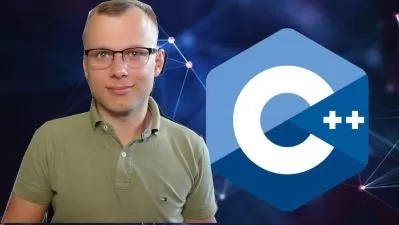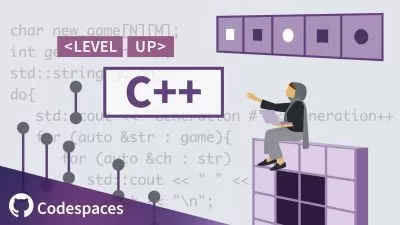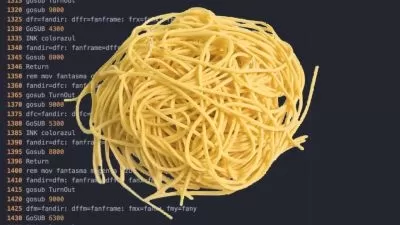Concurrency in Modern C++ : Crash Course ( including C++20 )
RougeNeuron Academy
1:57:30
Description
C++20, Multithreading, Concurrency, Modern C++, C++11,C++14, C++17, Parallel algorithms, Coroutines, Synchronization
What You'll Learn?
- Mastered the fundamentals of C++ concurrency syntax, enabling you to write efficient and high-performance concurrent code with confidence.
- Gained hands-on experience with the latest C++20 concurrency features, such as coroutines, cooperative cancellation, std::jthread, semaphore, barrier, and latch
- Enhanced your problem-solving skills by learning how to leverage modern C++ concurrency techniques to tackle complex and time-sensitive tasks in your projects.
- Acquired the ability to identify and apply the most suitable concurrency tools for various scenarios, ensuring that your code is both maintainable and scalable.
- Developed a strong foundation in C++ concurrency that will serve as a stepping stone for further exploration and mastery of advanced topics in concurrent and pa
Who is this for?
More details
DescriptionWelcome to "Turbocharge Your C++ with Concurrency: A Weekend Crash Course"!
Are you a programmer who has recently learned C++ and wants to unlock the true power of modern C++ concurrency? Look no further! In just one weekend, we will help you quickly grasp the essentials of C++ concurrency and supercharge your coding skills. These are skills that tools like ChatGPT will take years to develop.
In this fast-paced and intensive course, we will focus exclusively on the syntax of C++ concurrency, allowing you to understand and apply the features efficiently in your own projects. We know your time is valuable, so we've carefully designed short, easy-to-follow lectures that introduce syntax and explain its usage through concise examples. This way, you'll maximize your learning experience without getting bogged down in unnecessary details.
Our curriculum includes the latest C++20 features, ensuring you are up-to-date with cutting-edge concurrency tools. You'll learn about coroutines, cooperative cancellation, std::jthread, semaphore, barrier, and latches. These powerful features will take your C++ skills to the next level and make you a more effective and competitive programmer in today's fast-evolving tech landscape.
This course is perfect for you if you've just learned C++ and are eager to dive into the world of concurrency without spending weeks on theory and complex projects. By the end of this weekend, you'll have a solid understanding of modern C++ concurrency syntax and be ready to apply it in real-world scenarios.
So, what are you waiting for? Enroll now, and let's turbocharge your C++ skills with this weekend's crash course!
Why is Mastering Modern C++ Concurrency Features Crucial for Today's Programmers?
Understanding and utilizing modern concurrency features built into the C++ language is paramount in today's fast-paced, technology-driven world. Writing efficient, high-performance concurrent code is a highly sought-after skill as software applications and systems become increasingly complex and resource-intensive. By learning modern C++ concurrency features, you will unlock the true potential of multicore processors, significantly improving the performance and responsiveness of your applications. This knowledge sets you apart as a programmer and allows you to tackle complex, real-world problems more effectively. By investing in your skills and mastering modern C++ concurrency, you will stay ahead of the curve, becoming a valuable asset in the competitive software development landscape and opening up a world of opportunities in your career.
Evolution of the C++ Memory Model
The C++ concurrency model has evolved significantly from C++11 to C++20, introducing new language features and library components that provide more powerful and flexible support for concurrent programming. Here are some of the significant changes that have occurred:
C++11: C++11 introduced the first set of language-level concurrency features, including the std::thread class for creating and managing threads, mutexes and condition variables for synchronization, and atomic types for lock-free programming. C++11 also defined the Sequential Consistency-Data Race Free (SC-DRF) memory model, which guarantees correct behavior for well-synchronized programs.
C++14: C++14 introduced several improvements to the concurrency features introduced in C++11, including new constructors and member functions for std::thread, support for heterogeneous lookup in concurrent containers, and enhancements to the std::atomic template.
C++17: C++17 introduced several new concurrency features and enhancements, including support for parallel algorithms in the Standard Template Library (STL), structured bindings for returning multiple values from std::thread functions, and support for shared_mutex for shared read access and exclusive write access. C++17 also introduced a new memory model that provides stronger guarantees for atomic operations.
C++20: C++20 builds on the concurrency features introduced in previous language versions and adds several new features and enhancements. These include the atomic_ref class, which provides a safer way to access shared variables without the need for explicit synchronization, improvements to the memory model to reduce the need for explicit fences and barriers, and enhancements to the coroutines library that make it easier to write asynchronous code.
The evolution of the C++ concurrency model from C++11 to C++20 has provided developers with a more powerful and flexible set of tools for writing efficient and correct concurrent programs. The new language features and library components introduced in each version have addressed many of the challenges and limitations of earlier versions. In addition, they have made concurrent programming in C++ more accessible and easier to use.
Who this course is for:
- Novice C++ developers: If you've recently learned the basics of C++ programming and are eager to expand your knowledge and skills, this course is perfect for you. Our weekend crash course will quickly introduce you to the world of concurrency, allowing you to harness its power in your future projects.
- Self-taught programmers: For those who have learned C++ through online resources or personal projects but have not yet delved into concurrency, this course will bridge the gap. By focusing on syntax and practical examples, you'll gain a solid understanding of concurrency in modern C++ without getting lost in complex theories.
- Professionals transitioning to C++: If you're a programmer experienced in other languages and have recently begun working with C++, this course will help you quickly grasp C++ concurrency concepts. This knowledge will make you more efficient and versatile in your new programming environment.
- Busy developers seeking a quick refresher: If you have some experience with C++ but haven't worked with concurrency in a while or are unfamiliar with the latest C++20 features, this weekend crash course is an ideal way to quickly update your skills. You'll learn the most important aspects of modern C++ concurrency, enabling you to apply them immediately in your projects.
Welcome to "Turbocharge Your C++ with Concurrency: A Weekend Crash Course"!
Are you a programmer who has recently learned C++ and wants to unlock the true power of modern C++ concurrency? Look no further! In just one weekend, we will help you quickly grasp the essentials of C++ concurrency and supercharge your coding skills. These are skills that tools like ChatGPT will take years to develop.
In this fast-paced and intensive course, we will focus exclusively on the syntax of C++ concurrency, allowing you to understand and apply the features efficiently in your own projects. We know your time is valuable, so we've carefully designed short, easy-to-follow lectures that introduce syntax and explain its usage through concise examples. This way, you'll maximize your learning experience without getting bogged down in unnecessary details.
Our curriculum includes the latest C++20 features, ensuring you are up-to-date with cutting-edge concurrency tools. You'll learn about coroutines, cooperative cancellation, std::jthread, semaphore, barrier, and latches. These powerful features will take your C++ skills to the next level and make you a more effective and competitive programmer in today's fast-evolving tech landscape.
This course is perfect for you if you've just learned C++ and are eager to dive into the world of concurrency without spending weeks on theory and complex projects. By the end of this weekend, you'll have a solid understanding of modern C++ concurrency syntax and be ready to apply it in real-world scenarios.
So, what are you waiting for? Enroll now, and let's turbocharge your C++ skills with this weekend's crash course!
Why is Mastering Modern C++ Concurrency Features Crucial for Today's Programmers?
Understanding and utilizing modern concurrency features built into the C++ language is paramount in today's fast-paced, technology-driven world. Writing efficient, high-performance concurrent code is a highly sought-after skill as software applications and systems become increasingly complex and resource-intensive. By learning modern C++ concurrency features, you will unlock the true potential of multicore processors, significantly improving the performance and responsiveness of your applications. This knowledge sets you apart as a programmer and allows you to tackle complex, real-world problems more effectively. By investing in your skills and mastering modern C++ concurrency, you will stay ahead of the curve, becoming a valuable asset in the competitive software development landscape and opening up a world of opportunities in your career.
Evolution of the C++ Memory Model
The C++ concurrency model has evolved significantly from C++11 to C++20, introducing new language features and library components that provide more powerful and flexible support for concurrent programming. Here are some of the significant changes that have occurred:
C++11: C++11 introduced the first set of language-level concurrency features, including the std::thread class for creating and managing threads, mutexes and condition variables for synchronization, and atomic types for lock-free programming. C++11 also defined the Sequential Consistency-Data Race Free (SC-DRF) memory model, which guarantees correct behavior for well-synchronized programs.
C++14: C++14 introduced several improvements to the concurrency features introduced in C++11, including new constructors and member functions for std::thread, support for heterogeneous lookup in concurrent containers, and enhancements to the std::atomic template.
C++17: C++17 introduced several new concurrency features and enhancements, including support for parallel algorithms in the Standard Template Library (STL), structured bindings for returning multiple values from std::thread functions, and support for shared_mutex for shared read access and exclusive write access. C++17 also introduced a new memory model that provides stronger guarantees for atomic operations.
C++20: C++20 builds on the concurrency features introduced in previous language versions and adds several new features and enhancements. These include the atomic_ref class, which provides a safer way to access shared variables without the need for explicit synchronization, improvements to the memory model to reduce the need for explicit fences and barriers, and enhancements to the coroutines library that make it easier to write asynchronous code.
The evolution of the C++ concurrency model from C++11 to C++20 has provided developers with a more powerful and flexible set of tools for writing efficient and correct concurrent programs. The new language features and library components introduced in each version have addressed many of the challenges and limitations of earlier versions. In addition, they have made concurrent programming in C++ more accessible and easier to use.
Who this course is for:
- Novice C++ developers: If you've recently learned the basics of C++ programming and are eager to expand your knowledge and skills, this course is perfect for you. Our weekend crash course will quickly introduce you to the world of concurrency, allowing you to harness its power in your future projects.
- Self-taught programmers: For those who have learned C++ through online resources or personal projects but have not yet delved into concurrency, this course will bridge the gap. By focusing on syntax and practical examples, you'll gain a solid understanding of concurrency in modern C++ without getting lost in complex theories.
- Professionals transitioning to C++: If you're a programmer experienced in other languages and have recently begun working with C++, this course will help you quickly grasp C++ concurrency concepts. This knowledge will make you more efficient and versatile in your new programming environment.
- Busy developers seeking a quick refresher: If you have some experience with C++ but haven't worked with concurrency in a while or are unfamiliar with the latest C++20 features, this weekend crash course is an ideal way to quickly update your skills. You'll learn the most important aspects of modern C++ concurrency, enabling you to apply them immediately in your projects.
User Reviews
Rating
RougeNeuron Academy
Instructor's Courses
Udemy
View courses Udemy- language english
- Training sessions 48
- duration 1:57:30
- Release Date 2023/05/18
















